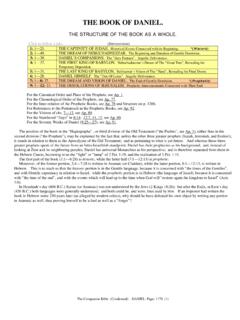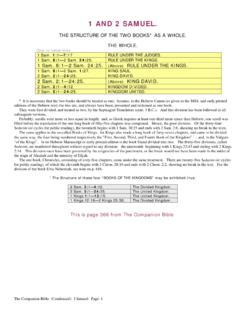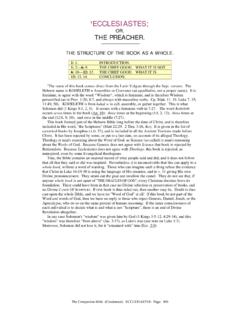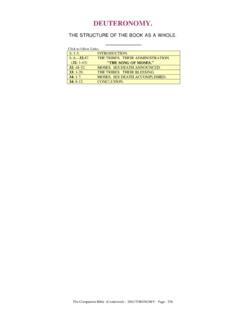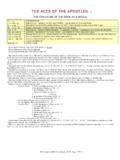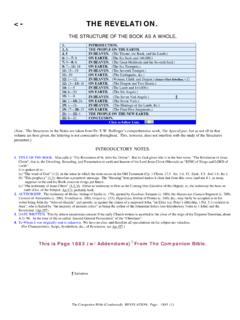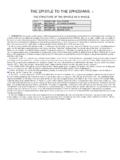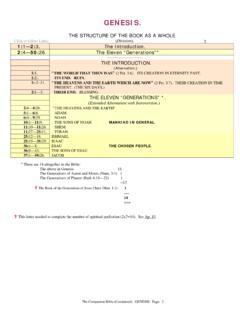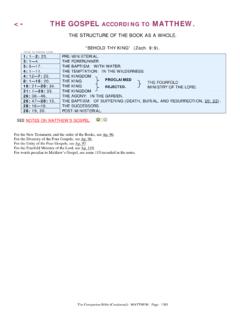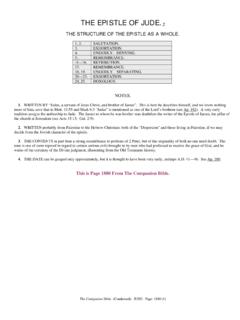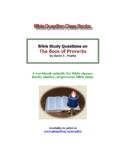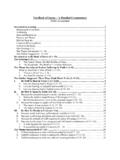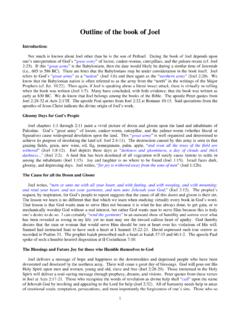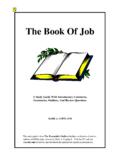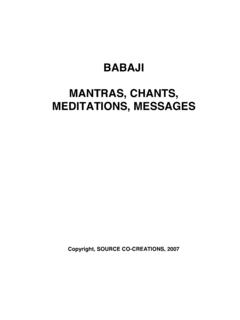Transcription of THE BOOK OF THE PROPHET ISAIAH.
1 THE book OF THE PROPHET isaiah . The Companion Bible (Condensed): isaiah : Page: 930 THE STRUCTURE OF THE book AS A WHOLE. (INTROVERSION.) 1:1 THE TITLE. 1: 2 5: 30. Exhortations: Reprehensory. Prophetic. 6: 1-13. The VOICE From The TEMPLE. The SCATTERING. 7: 1 12: 6. HISTORIC. Events and Prohpecies (AHAZ). 13: 1 27: 13. BURDENS. Alternated with ISRAEL S Blessings. 28: 1 35: 10. WOES. Alternated with JEHOVAH S Glories. 36: 1 39: 8. HISTORIC. Events and Prophecies (HEZEKIAH). 40: 1-11. The VOICE From the WILDERNESS.
2 The Gathering. 40: 12 66:24. Exhortations; Promissory. Prophetic. For the Canonical order and place of the Prophets, see Ap. 1, and p. 1207 For the Chronological order of the Prophets, see Ap. 77. For the Inter-relation of the Prophetic Books, see Ap. 78. For the Formula of Prophetic utterance, see Ap. 82. For the References to the Pentateuch by the Prophets, see Ap.
3 92. For the Inter-relation of the Minor (or Shorter) Prophets, see p. 1206. The Structure, above, declares the unity of the book . and effectually disposes of the alleged dual authorship and the hypothetical division of the book by modern critics into two parts: the "former" part being chs. 1 39, the "latter" part chs. 40 66. The "Voice ", in ch. 40:1-11, is necessitated in order to complete the Correspondence with 6:1-13 ; and, if an hypothesis is admitted on the one side, then it must be admitted on the other ; and it is hypothetically incredible that this dual reference to the "voice " could have been the outcome of a dual authorship.
4 For other evidences, see Ap. 79, 80, and 82. The DATE of the book is given as '' in the days of Uzziah, Jotham, Ahaz, and Hezekiah". In ch. 6:1, the prophecy there is given as being in the year that king Uzziah died ". According to Ap. 50, p. 59 (cp. Ap. 77), Uzziah died in 649 Historically, isaiah disappears from view after delivering the great prophecy of the Babylonian Servitude (2 Kings 20:16-18 and Isa. 39. 1-8). This was in the year 603 B, c., after Hezekiah's illness at the close of the siege of Jerusalem by Sennacherib in Hezekiah's fourteenth year (cp.)
5 Ap. 60, p. 60). We have thus two fixed dates, and between them a period of forty-six years, during which, undoubtedly, the Word of Jehovah came " through isaiah , and "God spake" by him. Though this period was covered and overlapped by the PROPHET 's life, it was not the whole of the period covered by the "vision", which goes far beyond the prediction of the Babylonish Captivity. Hezekiah lived for fifteen years after his illness, dying therefore in 588 B. C. Manasseh, his son, born in the third of the fifteen added years, succeeded in the same year (588 ).
6 How soon after his accession the Manassean persecution began we are not told; but it is highly improbable that a boy of twelve years would immediately commence the horrible things of which we are told in 2 Kings 21 and 2 Chron. 33. The unutterable religious" practices that lie behind the descriptive words in these chapters point clearly to some four or five years later, when Manasseh would be sixteen or seventeen. According to Jewish tradition, isaiah perished in the Manassean persecution ; when, it is said, he took refuge inside a hollow mulberry tree, which Manasseh ordered to be sawn through.
7 This may be referred to in Heb. 11:37. If we take the fifth year of Manasseh (584 ) as the date of isaiah 's death (violent or natural, we have no means of determining), then, from the year that king Uzziah died" (6:1, which forcibly suggests the terminus a quo of the whole book ) to this point, we have sixty-five years from the commencement of the " visions" till the supposed date of his death (649-584 B. C. - 65). See Ap. 77. If isaiah was about the same age as Samuel, Jeremiah, and Daniel were, at the beginning of their ministries, viz.
8 16-18, then we may conclude that the length of his life was some 81-83 years. There is no evidence that "the Word of the LORD came" to isaiah after the reign of Hezekiah ended in 588 , therefore the whole period covered by "the vision " of isaiah is sixty-one years (649-588=61). From that year onward till the thirteenth year of Josiah in 518 , there were seventy years during which God did not speak " by the prophets " (588-518 =70). The chart of the Prophets (see Ap. 77) shows that isaiah was contemporary with HOSEA from 649-611 years; with MICAH from 632-611 =21 ; and with NAHUM in the year 603 B.
9 1 year. THE SCROLL OF THE PROPHET isaiah . The Companion Bible (Condensed): isaiah : Page: 931 1 The vision of isaiah the son of Amoz, which he saw in vision concerning Judah and Jerusalem in the days of Uzziah, Jotham, Ahaz, and Hezekiah, kings of Judah. 2 Hear, O heavens, and give ear, O earth: for the LORD hath spoken [articulately], I have nourished and brought up sons, and they have rebelled against Me. 3 The ox knoweth his owner, and the ass his master's crib: but Israel doth not know, and My people doth not consider.
10 4 Ah sinful nation, a people heavily burdened with iniquity, a seed consisting of evildoers, sons that are corrupters: they have forsaken the LORD, they have despised and blasphemed the Holy One of Israel unto anger, they are gone away backward. (Rom. 11. 15). It is addressed to those who look for Messiah (8. 17 ; 45. 22) and those who "wait for Him" (8. 17 ; 25. 9; ; 33. 2). Uzziah (2 Chron. 26. 1-23. 649 B. C). Jotham (2 Chron. 27. 1-9). Ahaz (2 Chron. 28. 1-27). and. The absence of conjunctions between these names, and the Hebrew accents attached to them, seem to indicate that some of them reigned for a time jointly.
